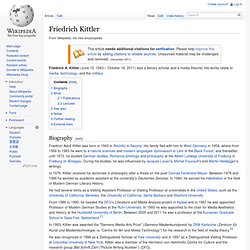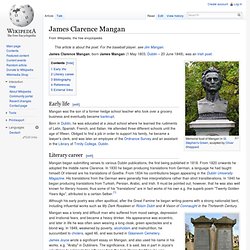

Friedrich Kittler. Friedrich A.

Kittler (June 12, 1943 – October 18, 2011) was a literary scholar and a media theorist. His works relate to media, technology, and the military. Biography[edit] In 1976, Kittler received his doctorate in philosophy after a thesis on the poet Conrad Ferdinand Meyer. Between 1976 and 1986 he worked as academic assistant at the university's Deutsches Seminar. He had several stints as a Visiting Assistant Professor or Visiting Professor at universities in the United States, such as the University of California, Berkeley, the University of California, Santa Barbara and Stanford University. From 1986 to 1990, he headed the DFG's Literature and Media Analysis project in Kassel and in 1987 he was appointed Professor of Modern German Studies at the Ruhr University. He was recognized in 1996 as a Distinguished Scholar at Yale University and in 1997 as a Distinguished Visiting Professor at Columbia University in New York.
Work[edit] Publications[edit] 2009: Musik und Mathematik. Anthropic principle. Browse Videos. Ergo-log.com. Books that will induce a mindfuck. Here is the list of books that will officially induce mindfucks, sorted alphabetically by author.

Those authors in bold have been recommended by one or more people as being generally mindfucking - any books listed under their names are particularly odd. You're welcome to /msg me to make an addition to this list. And finally, although he's way down at the bottom, my personal recommendation is definitely Howard Zinn's A People's History of the United States, as it turns the ultimate mindfuck: inverting the world-view of our entire culture, and it is non-fiction.
James Clarence Mangan. James Clarence Mangan, born James Mangan (1 May 1803, Dublin – 20 June 1849), was an Irish poet.

Early life[edit] Mangan was the son of a former hedge school teacher who took over a grocery business and eventually became bankrupt. Born in Dublin, he was educated at a Jesuit school where he learned the rudiments of Latin, Spanish, French, and Italian. He attended three different schools until the age of fifteen. Obliged to find a job in order to support his family, he became a lawyer's clerk, and was later an employee of the Ordnance Survey and an assistant in the Library of Trinity College, Dublin. Literary career[edit] Mangan began submitting verses to various Dublin publications, the first being published in 1818.
Grave of James Clarence Mangan, Glasnevin, Dublin. Mangan was a lonely and difficult man who suffered from mood swings, depression and irrational fears, and became a heavy drinker. James Joyce wrote a significant essay on Mangan, and also used his name in his works, e.g. Cognitive Policy Works. Politics - The Political Mind: Why You Can't Understand 21st-Century American Politics with an 18th Century Brain. George Lakoff. George P. Lakoff (/ˈleɪkɒf/, born May 24, 1941) is an American cognitive linguist, best known for his thesis that lives of individuals are significantly influenced by the central metaphors they use to explain complex phenomena. The more general theory that elaborated his thesis is known as embodied mind. He is professor of linguistics at the University of California, Berkeley, where he has taught since 1972.
Work[edit] [edit] Although some of Lakoff's research involves questions traditionally pursued by linguists, such as the conditions under which a certain linguistic construction is grammatically viable, he is most famous for his reappraisal of the role that metaphors play in socio-political lives of humans. Metaphor has been seen within the Western scientific tradition as purely a linguistic construction. He suggested that: A Politics & Moral Psychology Blog. Dokkōdō.
The "Dokkōdō" [ (Japanese: 独行道?)

; "The Path of Aloneness", "The Way to Go Forth Alone", or "The Way of Walking Alone"] is a short work written by Miyamoto Musashi (宮本 武蔵) a week before he died in 1645. It consists of either nineteen or twenty-one precepts; precepts 4 and 20 are omitted from the former version. "Dokkodo" was largely composed on the occasion of Musashi giving away his possessions in preparation for death, and was dedicated to his favorite disciple, Terao Magonojō (to whom the earlier Go rin no sho [The Book of Five Rings] had also been dedicated), who took them to heart.
Developing grit. Litemind. The Blog of Robert Greene. StumbleUpon.